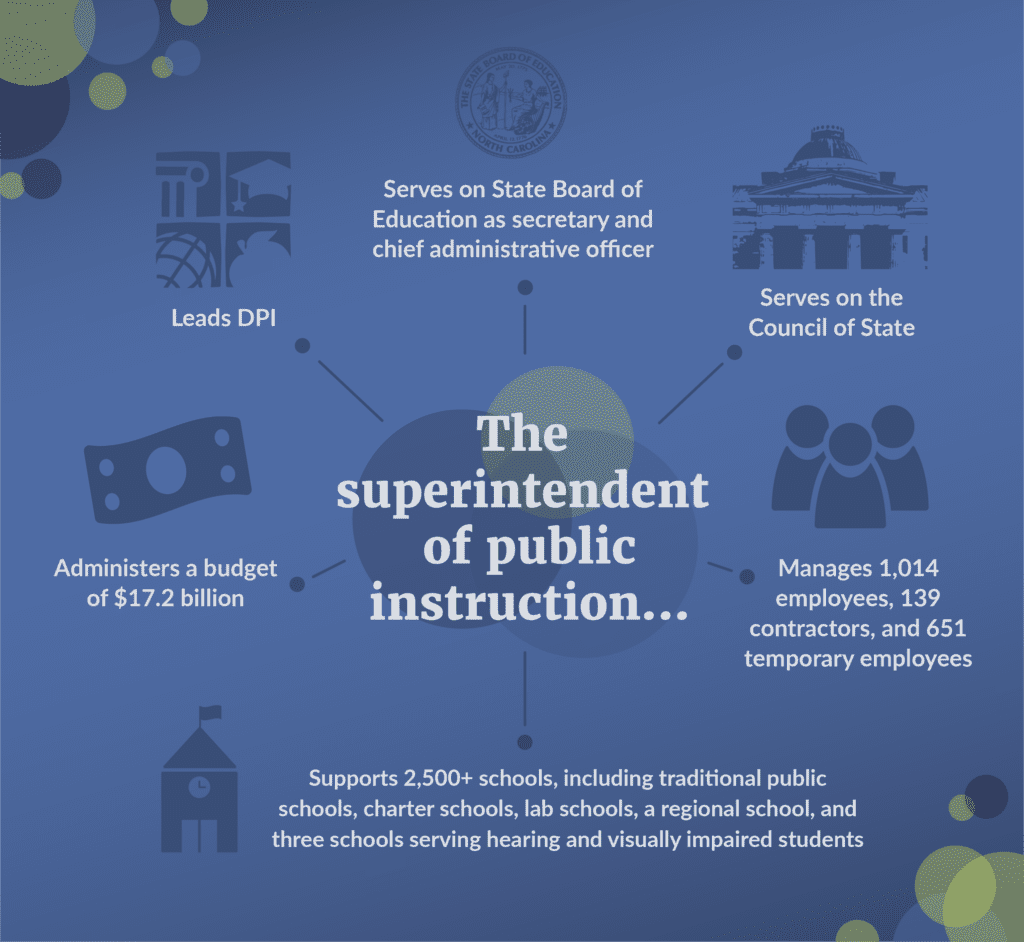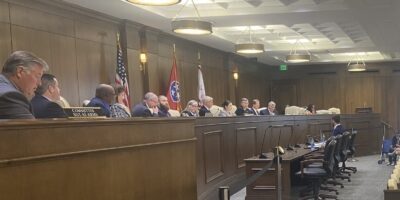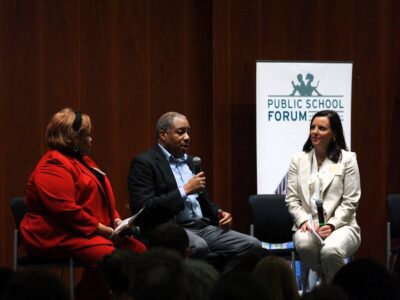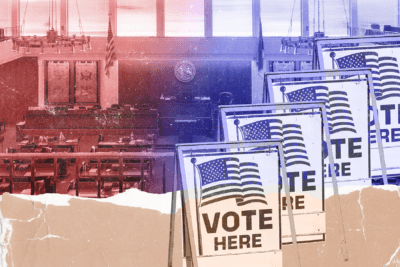
|
|
North Carolinians are receiving their absentee ballots and early voting is just around the corner — meaning soon the first votes of the 2024 general election will be cast. This year, Election Day is on Tuesday, Nov. 5.
This guide covers the six races that are important to our students, our educators, our state, and our future: the presidential race, governor, lieutenant governor, superintendent of public instruction, attorney general, and treasurer.
We have outlined each role, their responsibilities, and information about each candidate in this guide. The races are ordered according to how they appear on the ballot.
In-person early voting begins on Oct. 17. EdNC has also explained step-by-step how to verify your registration, ID requirements, and other important details on how to cast your vote in the article below.
Here is updated information for voters impacted by Hurricane Helene.
President/Vice President
During a general election year, the presidential race is typically the one Americans hear the most about.
This year, the presidential campaign includes many important and controversial issues – ranging from the economy and gun reform to immigration, abortion, and climate change. Whoever is elected will also lead federal education policy in the United States.
For starters, the president oversees the U.S. Department of Education (DOE) and appoints the secretary of education, who leads the department’s work. According to the DOE’s website, the department has 4,400 employees and a $68 billion budget.
Among other things, the DOE collects and disseminates data and research on schools, ensures equal access to education, and establishes policies on federal financial aid for education.
The DOE also helps disperse federal education funding to each state and then monitors how those funds are spent. Most recently, the department has monitored the disbursement and spending of billions of dollars in federal COVID-relief funds.
In 2025, the DOE estimates that $4.8 billion in federal dollars will benefit education in North Carolina.
This year’s presidential candidates — former President Donald Trump and Vice President Kamala Harris — did not discuss their proposed education policies during the Sept. 10 presidential debate. However, both candidates have previously spoken about their stances on various education issues. Take a look below.
Kamala Harris (D)
Vice President Kamala Harris is the Democratic nominee for president, following President Joe Biden dropping out of the race.
Harris’s campaign website lists two education-related policy priorities: “provide a pathway to the middle class through quality, affordable education” and “invest in affordable child care.”
Harris’s campaign says she “will strengthen public education and training as a pathway to the middle class.”
Her website says she will keep working to make higher education more affordable and “end the unreasonable burden of student loan debt.”
Her administration will also work to “scale up programs that create good career pathways for non-college graduates,” per her campaign website.
Regarding child care, her website says her administration will work to “ensure hardworking families can afford high-quality child care, all while ensuring that care workers are paid a living wage and treated with the dignity and respect they deserve.”
According to K-12 Dive, in her presidential primary campaign in 2020, Harris called for “significantly increasing” Title I funding. She also proposed incentives for states to perform racial and resource equity audits, increase public school spending with “more equitable funding formulas.” She also called for more money for Head Start – a federal pre-K program – and full funding of the Individuals with Disabilities Education Act.
During her 2020 campaign, Harris proposed a $315 billion plan to raise teacher pay by an average $13,500 per year. She has not yet made a specific policy proposal regarding teacher pay this year.
The 2024 Democratic platform calls for the use of school-based social and emotional supports, along with investments in literacy programs and efforts to reduce chronic absenteeism among students.
Harris’s running mate, Minnesota Gov. Tim Walz, is a former high school social studies teacher and football coach. His wife, Gwen Walz, was also an educator.
Walz’s governor website lists “historic investments in education” as his first “signature accomplishment.”
“Governor Walz signed a $2.3 billion education budget into law – the single-largest investment in public education in state history,” his website says. “Governor Walz and Lieutenant Governor Flanagan also provided Minnesota students free breakfast and lunch at school, created thousands of new pre-k seats, expanded access to mental health resources for students, and made significant investments to improve child literacy.”
Campaign information
Website: kamalaharris.com
Donald Trump (R)
Former President Donald Trump is the Republican presidential candidate.
The first policy of Trump’s education agenda says his administration would “cut federal funding for any school or program pushing Critical Race Theory (CRT), gender ideology, or other inappropriate racial, sexual, or political content on our children.” CRT is an academic framework that argues that racism is systemic and embedded within the country’s institutions.
Trump is also calling for “the direct election of school principals by the parents,” according to his website. In North Carolina, most principals are hired by their local board of education on the recommendation of the superintendent.
Here is a look at the complete list of Trump’s education policies, as listed on his website:
- Cut federal funding for any school or program pushing Critical Race Theory, gender ideology, or other inappropriate racial, sexual, or political content on our children.
- Direct the Departments of Justice and Education to open Civil Rights investigations into any school district that has engaged in race-based discrimination, including discrimination against Asian Americans.
- Because the Marxism being taught in schools is aggressively hostile to Judeo-Christian teachings, aggressively pursue potential violations of the Establishment Clause and the Free Exercise Clause of the Constitution.
- Find and remove the radicals who have infiltrated the federal Department of Education, and get Congress to reaffirm the president’s ability to remove recalcitrant employees from the job.
- Veto the sinister effort to weaponize civics education.
- Keep men out of women’s sports.
- Create a new credentialing body to certify teachers who embrace patriotic values, and understand that their job is not to indoctrinate children, but to educate them.
- Implement massive funding preferences and favorable treatment for all states and school districts that make the following historic reforms in education:
- Abolish teacher tenure for grades K through 12 and adopt Merit Pay
- Drastically cut number of school administrators, including the “DEI” bureaucracy
- Adopt a Parental Bill of Rights that includes complete curriculum transparency, and a form of universal school choice
- Implement the direct election of school principals by the parents, as the ultimate form of local control.
Trump has also promised to undo the Biden administration’s Title IX protections for LGBTQ+ students “on day one” of his presidency, according to a report by K-12 Dive.
On early childhood education, he has voiced support for expanding child tax credits.
Trump’s running mate, Ohio Sen. JD Vance, has also called to prohibit diversity, equity, and inclusion (DEI) initiatives. Among other things, he has criticized the “left-wing domination” in colleges and universities and criticized schools for “CRT indoctrination.”
Project 2025 and the 2024 Republican platform call for eliminating the DOE, and Project 2025 also calls for converting federal funding to block grants without strings or eliminating the funding altogether.
Project 2025, also called the 2025 Presidential Transition Project, was spearheaded by the conservative Heritage Foundation but includes a broad coalition of conservative organizations. Its policy manual, “Mandate for Leadership: The Conservative Promise,” is 30 chapters and 922 pages long. Trump is distancing his campaign from the project and said at the debate that he had not read it.
Campaign information
Website: donaldjtrump.com
Governor
At NC.gov, the governor is described as North Carolina’s chief executive.
All of the following agencies report to the governor: “Administration, Commerce, Environmental Quality, Health and Human Services, Information Technology, Natural and Cultural Resources, Military and Veteran Affairs, Public Safety, Revenue, and Transportation.”
The website goes on to describe them as: “serving as commander in chief of the state militia; chairing the Council of State; convening special legislative sessions; executing the laws of the state; granting pardons, commuting prison sentences, and issuing extradition warrants; joining interstate compacts; reorganizing and consolidating state agencies under his or her direct control; exercising final authority over state expenditures and administering funds and loans from the federal government; and delivering the annual state-of-the-state address to a joint session of the legislature.”
The governor also has the power of the pen. He can sign legislation passed by the General Assembly into law, or he can veto legislation.
This can be particularly important when it comes to the state budget, which largely sets out the state’s priorities when it comes to any number of issues, including education. Education receives the single largest share of the state budget.
The governor generally offers his own budget, which the General Assembly takes into account as the two chambers are formulating their own spending plans. Then, after the legislature passes a budget, the governor can sign off or veto, which can be overridden.
Mark Robinson (R)
Mark Robinson is North Carolina’s current lieutenant governor.
As lieutenant governor, Robinson has increasingly been the subject of worldwide headlines.
Following CNN’s recent report regarding his alleged comments on a porn forum, The Economist wrote: “The eye-popping crudeness of the new comments in effect ends Mr. Robinson’s chance of winning.”
Following the report, most of his campaign staff has resigned, the News & Observer reported, along with his staff in the lieutenant governor’s office.
This summer, before the CNN story broke, a speech at a church where Robinson said “some folks need killing” also made headlines.
Around the same time, the N.C. Department of Health and Human Services demanded that his wife’s former nonprofit, Balanced Nutrition, repay more than $132,000 in federal funds due to “seriously deficient” operations and financial management.
Robinson has said that he and his wife are victims of “political targeting” and a “high-tech lynching.”
Prominent Republicans including U.S. Sen. Thom Tillis have indicated they will not vote for Robinson.
As lieutenant governor, Robinson frequently missed monthly education board meetings, a WUNC report found.
Robinson has attended four of the State Board of Community College’s Board meetings since taking office, the report found. His former policy director, Jonathan Harris, attended most of the Board meetings in his place.
Robinson has attended about half of the State Board of Education’s meetings, WUNC reported.
Additionally, Robinson has called for denying federal education funding and dismantling the DOE. In his memoir, Robinson called to eliminate the State Board of Education.
On his website, his second of four top issues calls for improving the public education system by increasing teacher pay, providing educational options and opportunities, and advocating for Career Technical Education (CTE).
During a May convening hosted by the Public School Forum, Robinson said education is critical to the state’s economy.
At the event, Robinson said he would focus on the following specific education priorities if elected, along with adult education:
- Prioritizing “the basics” of reading, writing, and math, particularly in elementary schools.
- “Treating teachers better.” Robinson said this includes paying teachers better, but also making sure they are safe and supported in the school building.
- Ensuring students are more career ready and prepared for whatever postsecondary path they take.
“Education is the number one thing that you have to have, because it literally is going to determine the future of the state,” he said at the event.
Campaign information
Website: markrobinsonfornc.com
Email: info@markrobinsonfornc.com
Money raised as of June 30, 2024
$15,757,019.87
Josh Stein (D)
Josh Stein has served as North Carolina’s attorney general since 2017 and is the Democratic candidate for governor.
In an interview, Stein said his first priority as governor would be “to improve public education, chiefly by raising teacher pay and expanding access to community college.”
If elected, the campaign website says Stein will work to increase access to high-quality early childhood education, “give teachers meaningful pay,” and help reduce chronic absenteeism and mental health challenges.
His website also calls for “universal, healthy school meals for all public school students” and investment in CTE and student technology.
Finally, his website includes protecting students from gun violence, better supporting the state’s historically black colleges and universities (HBCUs), and making higher education more affordable. Specifically, Stein calls for “making our community colleges tuition no-cost for students training in our state’s growing, high-demand industries.”
At the Public School Forum event in May, Stein listed the following three primary education priorities:
- Funding schools through the Leandro plan.
- Educator recruitment and retention efforts, including an increase in teacher pay, the reinstatement of master’s pay, and increasing the number of school support faculty and staff (nurses, counselors, psychologists, teacher’s assistants, etc.).
- School mental health supports and safety initiatives (specifically gun safety protections).
“We have to invest in (our children) and their futures,” Stein said. “It’s gonna require a coalition of us to change the priorities of the legislature… we need them to pour into our public schools.”
Under Stein’s leadership, North Carolina was the first state in the nation to hold Juul, the e-cigarette maker, accountable for its role in marketing and selling e-cigarettes to young people. In all, the state will receive $47.8 million.
As attorney general, Stein has not sought a judicial ruling to block the updated federal Title IX regulations, which provide protections for LGBTQ+ students.
In a Sept. 11 press release, Stein criticized the General Assembly for passing a mini budget with additional funding for private school vouchers.
“The General Assembly’s decision to take billions of taxpayer dollars from public schools to pour into unaccountable private schools is a betrayal of every child’s right to a sound, basic public education,” he said.
As attorney general, Stein called on the state Supreme Court to require the state fund public schools through the Leandro case.
Campaign information
Website: joshstein.org
Email: info@JoshStein.org
X: @joshstein_
Money raised as of June 30, 2024
$32,910,029
Lieutenant Governor
The lieutenant governor sits on the N.C. State Board of Education and the State Board of Community Colleges.
Rachel Hunt (D)
Rachel Hunt is an attorney currently serving in the N.C. Senate.
Hunt’s website lists investing in public schools among her top priorities.
Her website says that “supporting North Carolina’s public schools is a part of my DNA.”
Her grandmother and mother were “proud public school teachers,” her website says, and her dad, former Gov. Jim Hunt, was “the Education Governor.”
Her website says she will continue to advocate for financial investment in the state’s public schools and against the expansion of private school vouchers.
Campaign information
Website: https://www.rachelhunt.com/
Email: info@rachelhunt.com
X: @HuntforNC
Money raised as of June 30, 2024
$1,927,335.36
Hal Weatherman (R)
Hal Weatherman formerly served as district director for former U.S. Rep. Madison Cawthorn and chief of staff for former Lt. Gov. Dan Forest and former U.S. Rep. Sue Myrick. He is the founder and president of the Electoral Education Foundation, a 501(c)(3) nonprofit organization dedicated to “election integrity” through digital snapshots of the voter file in North Carolina.
On his campaign website, Weatherman said “whole generations have been denied access to the American Dream by an education system more concerned with advancing cultural agendas than by teaching the building blocks of a successful life.”
If elected, Weatherman aims to “remove the stigma our society has placed on working in the trades,” streamline the Apprenticeship NC program, and give tax incentives to participating companies.
“North Carolina should be number one in Apprenticeships and I will accept nothing less,” his website says.
His website also says he supports putting an armed school resource officer (SRO) in every public school. Here is our EdExplainer on school safety, and here is more research on SROs.
Campaign information
Website: halweathermanfornc.com
Email: info@halweathermanfornc.com
Money raised as of June 30, 2024
$929,847.15
Attorney General
In North Carolina, the attorney general leads the state’s Department of Justice (DOJ).
Among other things, the attorney general represents the state in legal matters and provides legal opinions to elected and public officials when requested.
According to the DOJ’s website, the attorney general can also “institute court proceeding on behalf of the State, its agencies or its citizens in any and all public interest matters.”
The attorney general does not have the authority to prosecute specific crimes unless requested to do so by the local district attorney.
Jeff Jackson (D)
Jeff Jackson is an attorney who previously served in the N.C. Senate and currently represents the 14th district of North Carolina in the U.S. House of Representatives.
Jackson’s campaign website lists several education priorities, including investments in early childhood education, raising teacher pay, and supporting community colleges, HBCUs, and the rest of the UNC System.
In the state Senate, he has sponsored legislation to eliminate the pre-K waitlist, restore master’s pay for teachers, and expand rural broadband for students and teachers.
Campaign information
Website: jeffjacksonnc.com
Email: info@jeffjacksonnc.com
Money raised as of June 30, 2024
$7,178,475.07
Dan Bishop (R)
Dan Bishop is an attorney who previously served in the N.C. Senate and currently represents the 8th district of North Carolina in the U.S. House of Representatives.
While in Congress, Bishop has called for expanded school choice, the prohibition of teaching CRT in schools, and for “federal education dollars to follow the students, not the system.” CRT is an academic framework that argues that racism is systemic and embedded within the country’s institutions.
Campaign information
Website: votedanbishop.com
Email: info@votedanbishop.com
X: @danbishopnc
Money raised as of June 30, 2024
$2,979,495.11
Superintendent of Public Instruction
The state superintendent serves in North Carolina’s executive branch and is in charge of day-to-day operations of the N.C. Department of Public Instruction (DPI). The superintendent also serves as secretary and chief administrative officer of the State Board of Education and serves in the North Carolina Council of State.

Mo Green (D)
Mo Green is a lawyer, former district superintendent, and the former executive director of the Z. Smith Reynolds Foundation, a charitable foundation. He is the Democratic candidate for state superintendent.
Green lists these pillars on his website: “revere public school educators, celebrate the good in public education, ensure safe, secure learning environments, enhance parent and community support, prepare each student for their next phase in life, and invest fully in public education.” Here is his plan on how to achieve educational excellence.
From 2008-15, Green served as the superintendent of Guilford County Schools. Much of his campaign is based on this experience, he said.
He has repeatedly referenced graduation rate increases, college-level course pass rate improvements, and character distinctions during his time in Guilford County as proof of his abilities to increase academic achievement and school culture.
He has also said his experience in Guilford County, as well as a former role as deputy superintendent in Charlotte-Mecklenburg Schools, has prepared him to lead “complex educational organizations” like the Department of Public Instruction.
Green has two children, both of whom graduated from public schools.
Green’s campaign has focused on funding for public schools, a “reverence for teachers,” and improved student outcomes. Green has said he would advocate for higher teacher pay and higher per-pupil spending as superintendent.
During a Public Schools First debate on Sept. 14, Green said he would also aim to improve educators’ day-to-day work environment.
“We also need to work on working conditions for our educators, taking away many of the additional responsibilities that continually are being placed on our educators so they can do the work that they’re called to do,” he said. “We absolutely must have effective and strong leaders in each and every one of our schools, because, based on my experience, educators do respond well and want to stay when they are led by an effective leader.”
Green said he thinks teachers’ base salaries should start at $55-60,000. He said he also supports incentives for hard-to-hire positions and districts.
Green’s superintendency would prioritize character education, he said. In Guilford County, he implemented a program that emphasized certain character traits and required service learning. He said he would like to expand a similar effort statewide.
Green has said he believes students and teachers need high expectations and accountability. He also supports the “science of reading” effort and thinks it should be expanded into higher grades. He has said middle schoolers should be more frequently exposed to higher-level math. He also supports CTE expansion and allowing students to earn college credits while in high school.
“The vision that I put forward is, to utilize a quote from Dr Martin Luther King, Jr., ‘Intelligence plus character, that is a goal of true education,’ and to combine it with a focus on excellence, being the best,” Green said at the Public Schools First debate.
Green said the current A-F grade accountability system needs to change to better reflect the value of growth in students’ outcomes.
Green supports school choice, he has said in multiple debates. He has said he thinks there are lessons from public charter schools that should be used to improve traditional public schools. He does not support public funds paying for private school vouchers, he said.
“Public dollars should go into supporting public schools, that would be traditional public schools and charter schools,” he said during a Sept. 12 debate hosted by BEST NC. “And let’s be abundantly clear, you’re talking about hundreds of millions of dollars, which will turn into billions of dollars, through this taxpayer-funded private school voucher program, that are being drained away from our public schools, leaving our public schools with not enough resources to do what it is called upon to do.”
When it comes to school safety, Green has suggested increasing the number of mental health professionals in schools and “hardening” school buildings through metal detectors and other facility safety measures.
Green has said parents and teachers already work well together overall, calling the Parents’ Bill of Rights “a false narrative.”
To further facilitate parent engagement, Green has proposed expanding parent academies, which inform parents about school happenings and their role in their children’s education.
Green is supportive of initiatives that center diversity, equity, and inclusion, he said. He said he believes the roles of race and racism — in the country’s history and present day — are important to teach. These discussions should start “as early as possible,” he said at a debate at the LatinxEd Summit on Sept. 13.
At that summit, Green also said he supported paying teachers extra supplements for speaking two languages. He said newcomers schools are important environments to help support Latine students and families when they first arrive in the country.
Green said he would support efforts to increase the diversity of the teaching profession, including partnerships with HBCUs.
“Our schools are becoming more and more diverse as with regards to our students, and it would be beneficial for our students to be able to see themselves in teachers in every school building,” he said at the Public Schools First debate.
Campaign information
Website: mogreenfornc.com
Email: team@mogreenfornc.com
Money raised as of June 30, 2024
$975,545.50
Michele Morrow (R)
Michele Morrow is a former nurse and homeschool teacher. She is the Republican candidate for the superintendent of public instruction.
Here is Morrow’s issues page on her campaign website, which includes her stance on safe schools, academics first, parent-friendly schools, American unity and patriotism, getting D.C. out of N.C. schools, and ending wasteful spending.
Morrow has run for office once prior to this race – for Wake County School Board in 2022, when she came in second of three candidates.
This March, she unexpectedly beat incumbent Superintendent Catherine Truitt in the Republican primary.
Since then, she has made national headlines for previous social media posts that called for the execution of public leaders, confirmed her presence at the Jan. 6, 2021 riot at the U.S. Capitol, and suggested that then-President Donald Trump use the military to stay in power. Morrow has said in multiple debates that these statements have been taken out of context.
Morrow’s campaign is based on issues she discovered during her conservative advocacy in recent years and her experiences as a parent, she said. Morrow is a parent of five and homeschools her children. She has taught in “micro schools,” or groups of homeschooled children. None of her children have attended public schools in North Carolina.
Morrow is a supporter of school choice. She said she supports legislators’ recent expansion of private vouchers, which use public funds to pay for children to attend private schools. She has called the measure a “short-term solution” in debates. She also said she wants more collaboration between traditional public schools and public charter schools.
“Right now, it is absolutely necessary that we have healthy competition in the free market system,” Morrow said in a Sept. 12 debate hosted by BEST NC. “Competition creates the best product at the best price, and our public school system should be raising the bar so that we can keep everybody in our schools, and we can make people want to be there and to stay.”
Morrow’s campaign has focused on school safety and academic achievement. In both areas, Morrow has said public schools are failing. Improving academic outcomes and establishing a code of conduct would be priorities of her superintendency, she said.
When it comes to safety, Morrow has also called for placing at least two school resource officers in each school. Here is our EdExplainer on school safety, and here is more research on SROs.
She has said administrators need to establish clear behavioral expectations.
“Administrators’ No. 1 job should be to ensure that we are creating a culture of collaboration, of teamwork, of support, so that the entire school is looking towards success,” she said during a Public Schools First debate on Sept. 14.
Morrow has said no child should leave elementary school without being proficient in reading, writing, and math. She has mentioned the importance of career and technical education (CTE) opportunities for high schoolers.
She has expressed support for the state’s effort to train teachers in the “science of reading,” a body of research on how children learn to read. She said the effort should be expanded into middle school.
Morrow said she supports the Parents’ Bill of Rights, a controversial law passed by Republican legislators last year. It codifies parents’ roles in their children’s education and health. It also bans instruction involving sex or sexuality in K-4 classrooms and requires educators to share details with parents on any updates to children’s physical or mental health. This includes a change in requested pronoun use.
Morrow has repeatedly said that “social activism and political agendas” should be removed from classrooms. She has called for the removal of diversity, equity, and inclusion practices and social-emotional learning. She has said issues of race should not be discussed in early grades and called for the removal of CRT. CRT is an academic framework that argues that racism is systemic and embedded within the country’s institutions.
She has said history courses should tell children the truth while also instilling a sense of pride and optimism for the country in students.
Morrow said in the BEST NC debate that she has been fighting “to protect women in their sports and in their private places.”
She has also claimed on social media that the “plus” in “LGBTQ+” stands for “pedophilia,” which is untrue.
In a debate at the LatinxEd Summit on Sept. 13, Morrow called for more ESL (English as a Second Language) teachers and said she would support pay incentives for teachers who are bilingual.
Morrow said teachers’ base compensation should start at $50-55,000. She also said she would support incentives for teachers to work in hard-to-staff positions and rural areas of the state.
When asked about recruiting and retaining teachers, Morrow has proposed the expansion of mentorship for beginning teachers, advanced teaching positions, and teacher cadet programs for high schoolers interested in the profession.
Morrow has said that one of her first priorities as superintendent would be an audit of DPI, school districts, and program effectiveness.
Campaign information
Website: morrow4nc.com
Email: info@morrow4nc.com
Money raised as of June 30, 2024
$255,293.73
On Oct. 14, 2024, the Public School Forum of North Carolina held the final candidate debate between Morrow and Green. The debate was moderated by North Carolina Leadership Forum co-chairs, John Hood and Sen. Leslie Winner. The entire debate is available on YouTube.
Treasurer
The treasurer leads the Department of State Treasurer, which among other things, oversees and manages the state’s retirement and health care plans.
The State Health Plan provides health care coverage to more than 740,000 teachers, charter school employees, community college employees, other state employees, retirees, and dependents.
According to its website, the state’s pension plan distributes approximately $623 million to 334,562 members and beneficiaries each month. There are 643,508 total active and former employees who are or who have contributed money to the pensions system.
Wesley Harris (D)
Wesley Harris is currently serving in the N.C. House. According to his campaign website, Harris is a former educator and the son of “a lifelong public school teacher.” Harris has also worked in private economic consulting.
His website prioritizes protecting state bond ratings in order to “invest in infrastructure that improves people’s lives, like schools, clean water, and safe transportation.”
His website also talks about state employee benefits.
“In order to ensure the best possible future for our state, we need to have reliable benefits that will attract world-class employees to our schools and other public service jobs,” the website says. “Wesley will always make wise investment decisions that ensure we can reward public service with affordable healthcare and a great retirement.”
Campaign information
Website: harrisfornc.com
Email: wesley@harrisfornc.com
Money raised as of June 30, 2024
$819,403.14
Brad Briner (R)
Brad Briner currently sits on the Board of Trustees at UNC-Chapel Hill. He is also co-chief investment officer at New York-based investment firm Willett Advisors. He is known for managing Michael Bloomberg’s money.
Briner’s website says he is a conservative Republican and investment professional who believes in “profits not woke politics.”
Campaign information
Website: bradbriner.com
Email: brad@bradbriner.com
X: @brad_briner
Money raised as of June 30, 2024
$1,432,358.94

















